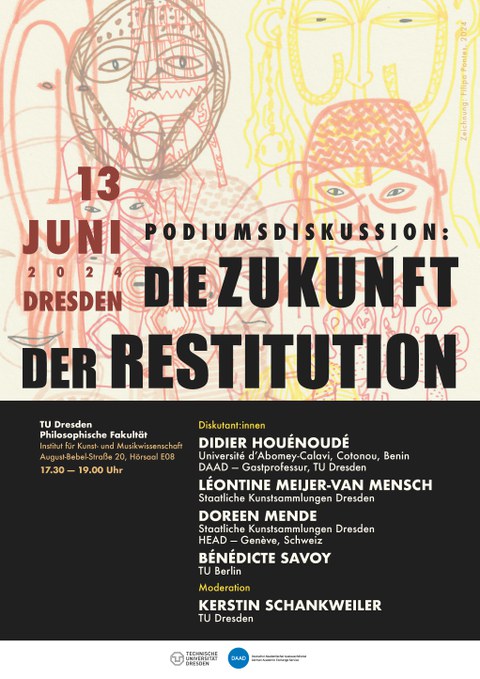Panel discussion "The future of restitution"
Table of contents
The return of 26 famous works of art from the former Kingdom of Dahomey to the present-day Republic of Benin in 2021 is considered a historic moment in the history of restitution. The objects came to France at the end of the 19th century as looted colonial art, and it was not until 2017 that President Emmanuel Macron promised to return looted cultural assets. The resulting public debate and the beginning of the fulfillment of this promise opened the door for further restitutions. In Germany, too, the decolonization of museum collections has since been driven forward and cultural assets have been restituted, for example the so-called Benin bronzes from Saxony, which the Staatliche Kunstsammlungen Dresden (Dresden State Art Collections) returned to Nigeria at the end of 2022. But what are the complex processes behind these restitutions? What cultural, political and social challenges are involved? Felwine Sarr and Bénédicte Savoy have pointed out that the return of cultural assets requires a "new relationship ethic". To what extent can restitution initiate new transcultural networks, collaborations and relationships? And finally, what is the future of restitution and what potential does it hold?
On the occasion of the one-year DAAD guest professorship of Didier Houénoudé, an internationally renowned art historian and expert on restitution from the Université d'Abomey-Calavi in Benin, the Institute of Art and Music at Dresden University of Technology invited him to a panel discussion.
The panel discussed with Didier Houénoudé:
Léontine Meijer-van Mensch, Director of the State Ethnographic Collections within the Staatliche Kunstsammlungen Dresden (Dresden State Art Collections)
Doreen Mende, Head of the cross-collection department "Research" at the Staatliche Kunstsammlungen Dresden (Dresden State Art Collections) and Professor at the HEAD-Genève HES-SO, Switzerland
Bénédicte Savoy, Chair of History of Art of Modernism at the Technical University of Berlin
The discussion was moderated by Kerstin Schankweiler, Professor for
Visual Studies in a Global Context at the TUD Dresden University of Technology.
WHEN: June 13, 2024, 17:30-19:00
WHERE: Institute of Art and Music, Faculty of Arts, Humanities and Social Science, TU Dresden
The CFF provided staff support through our Student Assistants before and after the event.
Photo impressions

Foto während der Podiumsdiskussion "Die Zukunft der Restitution", Institut für Kunst- und Musikwissenschaft, TU Dresden, 13.06.24, mit Blick von hinten aus dem Publikum auf das Podium mit v.l.n.r. Kerstin Schankweiler, Léontine Meijer-van Mensch, Didier Houénoudé, Bénédicte Savoy, Doreen Mende

Foto während der Podiumsdiskussion "Die Zukunft der Restitution", Institut für Kunst- und Musikwissenschaft, TU Dresden, 13.06.24, mit Blick von hinten aus dem Publikum auf das Podium mit v.l.n.r. Kerstin Schankweiler, Léontine Meijer-van Mensch, Didier Houénoudé, Bénédicte Savoy, Doreen Mende

Foto während der Podiumsdiskussion "Die Zukunft der Restitution", Institut für Kunst- und Musikwissenschaft, TU Dresden, 13.06.24, mit Blick auf das Podium mit v.l.n.r. Didier Houénoudé, Bénédicte Savoy, Doreen Mende

Foto während der Podiumsdiskussion "Die Zukunft der Restitution", Institut für Kunst- und Musikwissenschaft, TU Dresden, 13.06.24, mit Blick auf Didier Houénoudé am Mikrofon

Foto während der Podiumsdiskussion "Die Zukunft der Restitution", Institut für Kunst- und Musikwissenschaft, TU Dresden, 13.06.24, mit Blick auf das Podium mit v.l.n.r. Kerstin Schankweiler, Léontine Meijer-van Mensch, Didier Houénoudé im Gespräch

Foto nach der Podiumsdiskussion "Die Zukunft der Restitution", Institut für Kunst- und Musikwissenschaft, TU Dresden, 13.06.24, v.l.n.r. Bettina Lindorfer, Torsten König, Didier Houénoudé im Gespräch

Foto nach der Podiumsdiskussion "Die Zukunft der Restitution", Institut für Kunst- und Musikwissenschaft, TU Dresden, 13.06.24, Didier Houénoudé und Torsten König im Gespräch

Foto von Bettina Lindorfer beim Empfang nach der Podiumsdiskussion "Die Zukunft der Restitution", Institut für Kunst- und Musikwissenschaft, TU Dresden, 13.06.24

